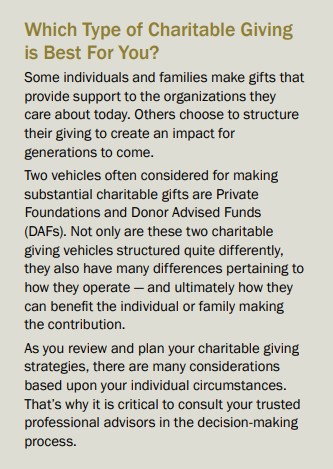
There are many ways to support the causes you care about, from writing a check to an organization providing aid for those in need to donating appreciated stock to your favorite charity. You likely give because your gifts help make the world a better place — and you’re not alone with your generosity.
While your charities of choice certainly benefit from your donations, so can you — your gifts could help reduce your tax burden.1
Before you give, answer a few questions to determine if this is a good time to plan a gifting strategy considering your current financial situation. Is your income stable? Do you have several months of emergency cash on hand to support your own expenses? Do you have family members who may need your help? Charity often begins at home — it’s okay to consider a more cautious approach with your charitable contributions. 
You may want to consider these suggestions to help you plan your charitable giving strategy before you donate.
Assess your personal financial situation.
It’s important to understand how much money you need to maintain your standard of living and how much remains — in assets or current income — for charitable causes. This assessment is particularly important with larger gifts.
Make sure your financial team — including your advisor, attorney, and tax professional — is aware of your charitable giving wishes (especially if you plan to donate large amounts of money, securities, real estate, or other tangible assets) and can advise you on the tax implications.
Establish your goals — focus on options.
If you are in the habit of giving money to every organization that sends you a donation request, you may want to reconsider. Find causes you are passionate about, and then identify organizations to support by determining whether your values and beliefs align with their mission.
Many individuals choose to give to their favorite charities during the holiday season as a last-minute tax strategy. Instead, each January choose the charities you want to support and create a charitable giving spreadsheet. Determine a total annual amount you want to give and allocate your donations throughout the year. Not only does this financial strategy allow you to manage your charitable giving within your personal budget, it also may be more beneficial for you and your charities from a tax standpoint.
Do your homework before you donate.
Research each charity on your spreadsheet before you make a donation. The organization should clearly articulate its mission and whom it serves and be able to share updates on mission objectives. You also should review the charity’s financial statements. While overhead costs are part of every organization, it is important to compare operating costs to program costs.
The Internal Revenue Service’s Tax Exempt Organization Search (TEOS)³ can provide information on an organization’s tax filings and verification of 501(c) status should you be interested in a tax deduction. Charity Navigator is a nongovernmental nonprofit organization which provides donors with objective ratings for more than 200,000 charities.4
Consider alternative forms of giving.
Don’t overlook the benefits to you and your charities from bequests, charitable gift annuities, qualified charitable distributions from IRAs, gifts in kind, endowments, and many other creative forms of giving. Check into matching gifts to help boost your donations — many grant makers, donors, and employers offer funds to match those given by other benefactors.
In addition to financial support, join the millions of Americans who volunteer to help their favorite charities by donating their time, talents, and energy to make a difference. Your hands-on experience will tell you how well-managed the organizations are and how effectively they accomplish their missions. 
Document your charitable gifts.
No matter how you give, documenting any and all gifts is crucial. Giving guidelines can vary greatly with the tax laws. As mentioned earlier, be sure to contact your advisor and tax professional before you make a charitable contribution to determine the detail of the documentation you will need at tax time.
Follow Up
Look at each donation as an investment in an organization. Check its website for progress on what it’s doing and what it has accomplished. Create a relationship with the organization and support it over time.
Contact a Commerce Trust advisor today to discuss the best strategies for your charitable giving now and in the future. A detailed conversation — particularly pertaining to large gifts — is a must to make sure you are forging the best path for your goals and financial situation.
1Consult a tax advisor
2Source: “Giving USA 2023: The Annual Report on Philanthropy for the Year 2022,” produced by the Giving USA Foundation and the Indiana University Lilly Family School of Philanthropy. Available online at www.givingusa.org. About Giving USA Foundation™; June 20, 2023
³Internal Revenue Service, “Tax Exempt Organization Search,” https://www.irs.gov/charities-non-profits/tax-exempt-organization-search, updated August 3, 2023
4Charity Navigator, https://www.charitynavigator.org/
The opinions and other information in the commentary are provided as of October 26, 2023. This summary is intended to provide general information only, and may be of value to the reader and audience.
This material is not a recommendation of any particular investment or insurance strategy, is not based on any particular financial situation or need, and is not intended to replace the advice of a qualified tax advisor or investment professional. While Commerce may provide information or express opinions from time to time, such information or opinions are subject to change, are not offered as professional tax, insurance or legal advice, and may not be relied on as such.
Data contained herein from third-party providers is obtained from what are considered reliable sources. However, its accuracy, completeness or reliability cannot be guaranteed.
Interested in more insights?
Subscribe Now.
Related Articles

 Luci Powell
Luci Powell